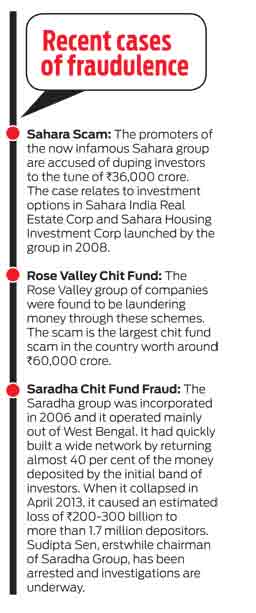Even after putting various financial regulations in place, the government could not put a stop to the evil of financial illiteracy with people easily falling prey to Ponzi schemes, which are financial traps.
The word Ponzi is attributed to Charles Ponzi, an Italian con artist, who had accumulated immense wealth in the early 20th century by organising such scheme. From then till now, people are lured looking at the astounding returns that Ponzi schemes offer without realising its consequences.
Why do people fall prey to such schemes?
“It is the lure of big money that attracts investors towards Ponzi schemes. Despite having stringent legislations and literacy programmes, there is hardly any decrease in the number of financial frauds,” said Rahul Agarwal, Director (Wealth Discovery), EZ Wealth.
“Everyone wants to make money quickly and investing in such schemes can be a way to do it,” he said, adding: “Besides the mental makeup of the borrower and the lender, economic reasons lead people to invest in such schemes. Investors include those who have spare money or those who are in need of money, as both are looking for quick and high returns.”
The Ponzi schemes often pay the returns to older customers from the money they get from new entrants in the schemes. And, people usually come to know of such schemes through word-of-mouth. “Many times, the early investors in the Ponzi schemes continue to see fantastic returns; hence many others become its representatives to help in their sales efforts. They talk about it to friends, relatives and strangers alike, believing that they want to share something that they have found to be very special,” Agarwal further added.

Usually, people coming from financially weak background fall prey to Ponzi schemes. Also, unemployment plays an important role. “Owners of these schemes try to involve bright unemployed youth with a good reputation in the rural areas as its agents. These local youths will always have more say and convincing power among the villagers than any outsider. The agents also make women their soft targets. Often the women in the rural areas invest in these schemes without letting the male members of the family know about it,” said a public sector bank official, which conducts financial literacy campaigns in Bengal and north-eastern part of the country. Lack of institutionalised investment options can be seen as another potential reason behind these Ponzi schemes still making inroads into the rural areas.
“Ponzi schemes play on the greed of investors. Their popularity depends on how well the story is told, who is telling the story and also the kind of conviction they have while telling it,” said Malhar Majumder, Partner, Positive Vibes Consulting and Advisory.
How to understand the authenticity of a scheme?
“First and foremost, you need to understand that there is no such thing as a free lunch or easy money. First, these schemes promise an exorbitant high rate of return. Next, they offer guaranteed returns. But, in the real world, high return and guaranteed return don’t go hand-in-hand. Thus, if someone approaches you with a scheme that guarantees ridiculous returns, you need to do a background check on the scheme,” said Vijay Kuppa, Co- founder, Orowealth.
Majumder said, “The question one should ask before investing is ‘what is the locus standi of the institution where one is investing’, ‘what will the institution do with the money’, ‘how, when and what do I get as a refund’ and ‘how the regular updates and reporting takes place’. No institution, barring banks, scheduled rated bonds or companies and in few cases insurance companies, can offer guaranteed return.”

Ponzi schemes often involve unregistered investments. So, if you are planning to invest in an unknown non-banking finance company (NBFC), then you should be aware of the fact that every NBFC is required to be registered with RBI. “If the scheme is not registered be cautious before investing in these schemes,” said Agarwal.
How do Ponzi schemes impact the financial system?
“This actually hampers the overall trust of investors (old and new alike) on upcoming genuine investment avenues. After such an experience, the investors tend to invest money only in banks, fixed deposits or PPFs. This seriously slows down the overall economic development of the country,” Kuppa further stated.
Agarwal said, “Once bitten twice shy is what exactly happens to investors after they get duped. They tend to completely withdraw from financial markets and lock their access in either extremely safe or sometimes unproductive assets such as gold and real estate.”
Every well functioning financial system is built on credibility, trust and integrity. “Ponzi schemes have undermined the confidence of many people. They are not good for the financial system in general,” he added. Is it region or state specific?
For sure, these schemes are more prominent where illiteracy is more. As a government bank official said, he had seen it more in two Midnapore districts in West Bengal and porous border areas in Assam.
However, Majumder, added: “They play on the ignorance and greed of people and reincarnate in different avatars all the time.”
Even the urban rich take part in such schemes where they play a gamble to increase their money, said the public sector bank official. “Many in the urban areas invest in such schemes to double their money thinking they can exit the scheme before it goes bankrupt,” the bank official added.
What measures should authorities adopt?
Agarwal said, an effective policy framework that is functional and has exceptionally severe penal clauses in case of a breach is a prerequisite to effectively curb these ill practices, should be put in place.
“Also the government should focus on educational initiatives enlightening people against these schemes especially in the rural areas. Swift justice should be ensured through special courts and the promoters of such schemes should be given extremely severe punishments to set an example,” he added.
The government has recently tabled the Banning of Unregulated Deposit Schemes Bill, 2018 and the Chit Funds (Amendment) Bill, 2018 in the parliament, in order to curb Ponzi schemes. These bills aim to regulate the solicitation and acceptance of deposits by various business entities, which otherwise are not regulated by RBI or SEBI. These bills also aim to register all the deposit-taking entities with a competent authority.

Even the RBI had cautioned people through a circular in 2015 saying: “Members of public should not to be tempted by promises of high returns offered by entities running Multi-level Marketing/Chain Marketing/Pyramid Structure Schemes. The Reserve Bank has reiterated that falling prey to such offers can result in direct financial losses and they, in their own interest, should refrain from responding to such offers in any manner.” It also stated that MLM/Chain Marketing/Pyramid Structure schemes promise easy money upon enrolment of members. Income under such schemes majorly comes from enrolling more and more members from whom hefty subscription fees are taken rather than from the sale of products they offer. It is incumbent upon all members to enroll more members, as a portion of the subscription amounts so collected is distributed among the members at the top of the pyramid.
aparajita@outlookindia.com, anagh@outlookindia.com suyash@outlookindia.com

